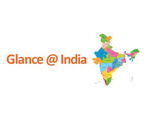70th Independence Day of India
August15, 2016
Message from H.E. Sujan R. Chinoy
Ambassador of India to Japan
1. On the occasion of the70th Independence Day of India, I convey warm greetings to Their Majesties, the Emperor and Empress of Japan, the Government andthe people of Japan.On this important day, I also wish to extend greetings to my fellow Indians living here who have contributed actively to further relations between India and Japan.
2. On this historic day in 1947India attained independence,breaking the shackles of colonialism. The national movement led by the Father of the Indian Nation, Mahatma Gandhi, reaffirmed the values of peace and non-violence. Modern India “awoke to life and freedom” with the hoisting of Tricolor at the stroke of midnight on 15th August 1947.The ideals and convictions of our forefathers weresubsequently engraved in theprinciples of our Constitution which continues to beour beacon even today.
3. The past year has seen the Indian economy continue on a high growth trajectory, under a stable government led by Prime Minister Narendra Modi. India’s GDP expanded at a healthy 7.6% in FY 2015-16, which is the highest growth rate recorded in the last five years. This is thefastestgrowth rate among the world’s large economies. India has emerged as a credible economic player at atime when global economic growth elsewhere remains weak.
4. An enabling environment for investments, macro-economic stability, a large domestic market andlower labour costs,together with youthful human resources,combine to make India a very attractive economic partner. JBIC Surveys for 2014 and 2015 have ranked India as the most preferred destination for Japanese manufacturing companies, which is an encouraging sign for the future of India-Japan economic ties. India is today Japan’s largest ODA partner.
5. Japan continues to play an important role in facilitating the growth and economic development of India. As Prime Minister Modi said during Prime Minister Abe’s visit to India in December 2015, “no partner has played such a decisive role in India’s economic transformation as Japan. No friend will matter more in realizing India’s economic dreams than Japan.” Japanese ODA has supported India's economic development in priority areas such as power, transportation, environment and social sectors such as health and education. The growing convergence between Japan and India on strategic and economic issues under our “Special Strategic and Global Partnership” has also served to stimulate interest in India’s growth story.
6. The Government of India has initiated several flagship programmes to stimulate growth and to realize the full potential of the Indian economy. Among them are the Make in India, Digital India, Skill Indiaand Smart Citiesinitiatives, which aim to raise the competitiveness of India's manufacturing sector by inviting top global companies to set up their manufacturing base in the country, connecting the nation through physical and digital infrastructure, and, creating global supply chains that tap into and radiate from the Indian economy.
7. The complementarities between our two economies provide both countriesa chance to combine Japan's capital and technology with India's rich human resources and skills.Japan is already India's 4th largest foreign investorand is actively taking part in the“Make in India” initiative. Japanese companies havebegun to valueIndia's potential as a global manufacturing hub. Automakers are expanding their production base in India, targeting not only the domestic market but also making India a hub for their exports to West Asia, Africa and even to Japan. Japanese companies have been keen to take part in Start-Up India, a flagship initiative launched by Prime Minister Modi earlier this year, to promotestart-up ventures, to boost entrepreneurship andto create jobs.
8. Prime Minister Abe’s successful visit to India last year imparted a fresh momentum to our relationship with the signing of an array of agreements, including the MoU introducing Japanese Shinkansen technology for the Mumbai-Ahmedabad High Speed Rail (MAHSR) Project. The Shinkansen, known for its speed, reliability and safety, is seen in India as vehicle to embark on a high-growth trajectory through better connectivity, on the lines of Japan’s own transformationhalf a century ago. Our two governments are working on expediting the landmark project following the recently-held second meeting of the MAHSR Committee in Tokyo on 16 May 2016.
9. I take this opportunity to encourage Japanese citizens to more fully utilize the “Visa on Arrival” scheme, for all categories of visitors, implemented from March 2016, as also the Embassy’s recent initiative of issuing long-term visasup toten years for visitors travelling to India on business.
10. I look forward to working closely with the Government of Japan, captains of business and industry, scholars and scientists, and the friendly people of Japan at large, to promote friendship and cooperation between India and Japan.
(Sujan R. Chinoy)
***

























